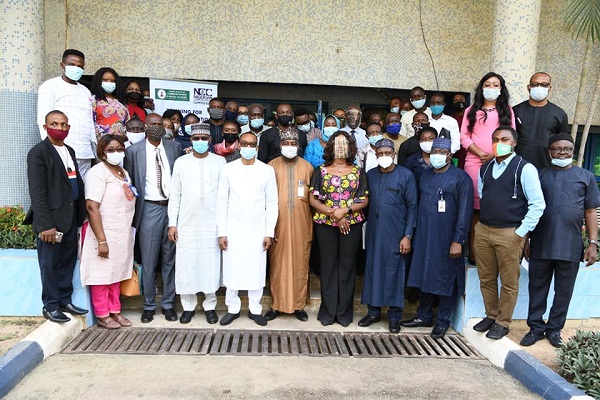Telecom
Danbatta Applauds Media Role in Nigeria’s Telecoms Development

Prof. Umar Garba Danbatta, Executive Vice Chairman of the Nigerian Communications Commission (NCC), has commended its media stakeholders for their role in accurate, timely and effective reportage of the telecommunications sector.
Danbatta gave the commendation while declaring open a two-day media capacity building programme organised under the auspices of the Nigeria Information Technology Reporters Association (NITRA) on Tuesday, October 27, 2020 at the Digital Bridge Institute (DBI), Abuja.
“I must applaud every member of NITRA for working assiduously to provide coverage for our activities, as well as provide a platform for our narratives in terms of the various policy initiatives and actions taken to support the national economy.
“Without your continuous cooperation, understanding and professionalism, the Nigerian audience would not have been properly informed about the activities of the NCC,” he said.
Represented by Dr. Ikechukwu Adinde, director, Public Affairs, NCC, Danbatta stated that the ICT industry in Nigeria is, indeed, the most dynamic and most resilient, as it continues to evolve by the day.
According to him, with the shutdown of almost every sector of the economy since the outbreak of COVID-19 pandemic, telecoms sector has continued to provide government and businesses the platform to operate and transact online to ensure that the country’s developing economy is sustained.
The EVC, however, noted that the advancements in ICT have reshaped every facet of human endeavour from learning, teaching and communication to other sectors of the economy.
He said the dynamic nature of ICT industry has, thus, informed the NCC’s decision to continuously train journalists, with a view to equipping them with the necessary skills they need to report the industry, adding that the misconceptions and misinformation that have trailed the proposed rollout of Fifth Generation (5G) network in the country is a case in point.
“Therefore, we will not relent in our quest for an improved ICT industry in Nigeria and in pursuit of this objective, we will periodically assemble seasoned professionals to educate and enlighten you on the latest trends in the global ICT industry,” he said.
He said while the training is in line with the Federal Government’s recognition of the important role journalism has played in the development of Nigeria’s ICT industry, it is also consistent with one of the critical pillars of NCC’s strategic plan on strategic partnership and collaboration with various stakeholders, including the media.
He urged the participants to take the training seriously and take advantage of it to expand their horizons of knowledge on the ICT industry.
“This is very necessary so that when you report events or activities relating to the industry, you are able to translate them into a language that the common man will readily understand for the overall development of the industry,” Danbatta said.
“It is our duty and responsibility to ensure that whatever we want to introduce to the Nigerian telecoms space is well understood by Nigerians and all those who make use of our telecoms services and the media forms a part of our critical external stakeholders to make this happen,” the EVC added.
Telecom
V-Malaysia 2025: QNET Strengthens Global Network with Landmark 5-Day Event

QNET, leading global wellness and lifestyle direct-selling company, has successfully concluded V-Malaysia 2025, its flagship annual convention, at the Penang SPICE Convention Centre in Malaysia. Held from 21–25 June, the five-day event drew over 8,000 participants from more than 30 countries, including Nigeria, reinforcing the company’s global reach and strong foothold in the African market.

For over a decade, QNET has chosen Penang as the destination for this transformative event, which blends business networking, entrepreneurial development, and immersive personal growth experiences.
The 2025 edition underscores the continued collaboration between QNET, its event partner V Global Management (The V), Tourism Malaysia, the Malaysia Convention and Exhibition Bureau (MyCEB), and its state-level affiliate, Penang Convention and Exhibition Bureau (PCEB).
In Nigeria, QNET has steadily gained recognition as a key player in the direct selling and wellness space, empowering thousands of Nigerians with entrepreneurial opportunities, health-conscious products, and financial education.
Through its innovative business model, QNET has fostered a growing community of independent distributors across states like Lagos, Abuja, and Port Harcourt. Events such as V-Malaysia provide distributors a platform to connect with the global QNET network, learn from top leaders, and gain exposure to cutting-edge tools and products that can be leveraged in their local businesses.
V-Malaysia has evolved into a premier platform for business networking, entrepreneurial development, and cross-cultural collaboration. The synergy between QNET and The V — an internationally recognised organisation specialising in large-scale training and events has been pivotal in building the convention’s global draw.
YB Wong Hon Wai, Penang State EXCO for Tourism and Creative Economy (PETACH), emphasised the regional impact of V-Malaysia: “Penang’s vibrant tourism and business events ecosystem continues to attract top-tier events like QNET’s V-Malaysia.
In 2024 alone, Penang recorded an estimated RM1.29 billion in economic impact from such events – a testament to their significance. QNET’s long-term commitment brings not only economic value but also strengthens Penang’s global reputation.”
Trevor Kuna, Chief Marketing Officer of QNET, added: “For QNET, Penang is more than just a venue; it’s a home for inspiration, collaboration, and transformation.
“Our strong base in Nigeria and across Africa makes this event especially meaningful, as we bring together entrepreneurs from across the continent to share ideas and build cross-border relationships that accelerate personal and economic growth.”
The Malaysia Convention and Exhibition Bureau (MyCEB), a government agency under the Ministry of Tourism, Arts and Culture and parent body of PCEB, plays a pivotal role in Malaysia’s business events ecosystem. In 2023 alone, MyCEB facilitated 248 business events, brought in over 180,700 international delegates, and generated about RM 2.8 billion in economic impact.
For V-Malaysia 2025, MyCEB’s expertise in destination marketing, strategic facilitation, and coordination between federal and state levels (through PCEB) has been instrumental in elevating Penang’s standing as a premier MICE hub.
Complementing this effort is Tourism Malaysia, whose targeted incentives and logistical backing helped deliver V-Malaysia 2025 as a high-impact global event. Their support underscores the government’s broader commitment to positioning Malaysia as a top-tier host for international conferences and high-impact corporate events.
As part of the event’s activities, QNET also unveiled new wellness innovations, including Harmoniq, a bio-signaling patch designed to enhance energy and well-being, and QWIK, a line of oral health and nutrition strips — products set to expand into markets like Nigeria in the coming year.
V-Malaysia 2025 is not just a celebration of innovation and entrepreneurship; it is a dynamic platform that exemplifies how global vision and local action, especially across Africa, can reshape the future of direct selling. For more information about V-Malaysia 2025, please visit QNET’s official website.
Telecom
Instagram Safety Tools Every Parent Should Know About

In today’s digital world, teens are using social media to connect with their friends, learn and explore their interests.

Instagram has developed a variety of tools to give parents peace of mind, support safer interactions, and empower teens to make thoughtful decisions online. Whether you’re new to the platform or want to stay informed, here are essential safety tools every parent should know about:
Teen Accounts: Teen Accounts were designed to support parents better and give them peace of mind that their teens have the right protections in place. Teen Accounts have built-in protections that limit who can contact them and the content they see. By default, teen accounts are set to private and teens under 16 can only change this default setting with help from a parent or guardian.
Supervision tools (parental controls): As part of Teen Accounts, Instagram offers supervision features that allow parents to stay involved in their teen’s experience on the app. With this feature, parents can monitor how much time their teen spends on Instagram, view who they follow and who follows them, receive updates when their teen reports accounts or content, and set daily time limits or scheduled breaks to help manage usage.
Daily time limit: The daily time limit feature is also part of Teen Accounts. It allows parents and teens to set limits on app usage, encouraging healthier and more mindful engagement over time.
Block, restrict and report feature: Teen Accounts include tools that allow teens to block or restrict people they don’t want to interact with and report harmful content or behavior. Restricted users won’t be able to see when your teen is online or if they’ve read messages.
Sensitive content control: This safety feature, also available through Teen Accounts, lets users filter out potentially upsetting or mature content in Explore and other surfaces. content across Explore and other surfaces.
Educational Family Center: Instagram’s Family Center is an educational hub that provides articles and guidance to help parents have meaningful conversations with their teens about their online experiences and how to make time spent online a positive experience. The hub focuses on providing parents with practical tools from online safety experts, organisations and academics on everything from bullying to cybersecurity.
Take time to explore these features with your teen and use them as a starting point for open, ongoing conversations about their online life. When parents and teens navigate these digital spaces together, everyone wins.
Telecom
Free WiFi Meets Mega Entertainment at the Grand Opening of Solution Fun City

In a bold move to blend digital empowerment with fun and entertainment, the Anambra State ICT Agency, in partnership with the Geeks and Founders Alliance for Soludo (GEFAS), announces the availability of free WiFi at the Anambra Mega Fest/Grand Opening of Solution Fun City.

Powered by Pine Heights Systems (PHSWEB), this initiative reinforces the state government’s commitment to bridging the digital divide and bringing connectivity directly to the people.
Set to hold on Saturday, June 28, 2025, at 1 PM, the grand opening of Solution Fun City will light up Awka with a mix of tech-forward innovation and high-energy entertainment, all under the distinguished hosting of Governor Charles Chukwuma Soludo, CFR.
Attendees are in for a tech-enhanced experience featuring music, dance, comedy, games, and electrifying performances from Flavour, Umu Obiligbo, JeriQ, Jennifer Eliogu, Ugoccie, Apete, Ojadili, Ogbuefi I Go Tuk, Onye Obodo, Prince Neche, and many more.
“Technology is one of the greatest equalizers of our time.
Through digital access, we are not only empowering citizens, we are deepening civic participation and driving progress,” said Chukwuemeka Fred Agbata, MD/CEO of the Anambra State ICT Agency and Convener of GEFAS.
The event signals a new chapter in Anambra’s smart governance journey, where technology, inclusivity, and community celebration come together in one dynamic space.
To connect to the Free WiFi: turn your phone’s WiFi, select Soludo Solution WiFi and follow the prompts on the landing page
For details, call: 0201 410 1240
Follow the conversation: @gefasoludo across all social media platforms.

 General News2 days ago
General News2 days agoNigeria’s BNPL Market is Projected to Value @ $2.6B by 2030

 Telecom2 days ago
Telecom2 days agoFree WiFi Meets Mega Entertainment at the Grand Opening of Solution Fun City

 E-Financial2 days ago
E-Financial2 days agoNIA Puts Industry Written Premium @ N1.5trn in 2024

 Telecom2 days ago
Telecom2 days agoInstagram Safety Tools Every Parent Should Know About

 E-Financial3 days ago
E-Financial3 days agoFlutterwave Named in 2025 TIME100 Most Influential Companies List

 Telecom3 days ago
Telecom3 days agoNCC Unveils Landmark RIA Report, Reinforces Stakeholder-Centric Regulation

 General News3 days ago
General News3 days agoAfDB Cuts Nigeria’s Growth Projection to 3.2%

 Telecom2 days ago
Telecom2 days agoV-Malaysia 2025: QNET Strengthens Global Network with Landmark 5-Day Event
























